(1-21) Assur, the great lord, king of all the great gods; Anu,
king of the Igigi and Anunnaki, the lord of lands; Enlil, the exalted, father
of the gods, the creator; Ea, king of the Deep, who determines destiny; Sin,
king of the tiara, exalted in splendor; Adad, mighty, pre-eminent, lord of
abundance; Shamash, judge of heaven and earth, director of all; Marduk, master
of the gods, lord of law; Urta, valiant one of the Igigi and the Anunnaki,
the almighty god; Nergal, the ready, king of battle; Nusku, bearer of the
shining scepter, the god who renders decisions; Ninlil, spouse of Bêl,
mother of the great gods; Ishtar, lady of conflict and battle, whose delight is
warfare, great gods, who love my kingship, who have made great my rule,
power, and sway, who have established for me an honored, an exalted name,
far above that of all other lords!
Shalmaneser, king of all peoples, lord, priest
of Assur, mighty king, king of all the four regions, Sun of all peoples,
despot of all lands; son of Assur-nâsir-pal, the high priest, whose
priesthood was acceptable to the gods and who brought in submission at his
feet the totality of the countries; glorious offspring of Tukulti-Urta, who
slew all of his foes and overwhelmed them like a deluge.
(22-26)
At the beginning of my reign, when I solemnly took my seat upon the royal
throne, I mobilized my chariots and troops; I entered the passes of the land
of Simesi; I captured Aridu, the stronghold of Ninni.
(26-31)
In my first year, I crossed the Euphrates
at its flood; I advanced to the shore of the sea of the setting sun; I washed
my weapons in the sea; I offered sacrifices to my gods. I climbed Mount Amanus;
I cut cedar and cypress timbers. I climbed Mount Lallar, and set up my royal
image.
(32-35)
In the second year of my reign, I drew near
to Til-barzip. I captured the cities of Ahuni, son of Adini. In his city
I shut him up. I crossed the Euphrates at its flood; I captured Dabigu, a
fortified city of Hatti, together with the towns of its neighborhood.
(35-44)
In the third year of my reign, Ahuni, son
of Adini, was frightened before my mighty weapons and retreated from Til-barzip,
his royal city. I crossed the Euphrates. I seized for myself the city of
Ana-Assur-utir-asbat, which lies on the other side of the Euphrates, on the
Sagur river, which the Hittite people called Pitru. When I returned, I entered
the passes of the land of Alzi; the lands of Alzi, Suhni, Daiaeni, Tumme,
Arzashkunu, the royal city of Arame, the Armenian (king), Gilzânu,
and Hubushkia (I conquered).
(45-52)
In the eponymy of Daian-Assur, I departed from Nineveh, crossed the Euphrates
at its flood, and pursued Ahuni, son of Adini. He made Shitamrat, a mount
peak, which is on the bank of the Euphrates, his stronghold. The mountain
peak I stormed and captured. Ahuni, together with his gods, his chariots,
his horses, his sons, his daughters, his troops, I carried off and brought
to my city, Assur. In that same year I crossed Mount Kullar and descended
against Zamua, which lies inside. I captured the cities of Nikdiara: the
city of Ida and Nikdima.
(52-54)
In the fifth year of my reign, I went up against
Mount Kashiari. I captured eleven strongholds. I shut up Assur-itti-sheruriai
in his city. His many gifts I received from him.
(54-62) In the sixth year of my reign,
I drew near to the cities on the banks of the Balih. They slew Giammu,
governor of their cities. I entered Til-Mâr-ahi. The Euphrates I crossed
at it flood. I received gifts from all the kings of Hatti. At that time Hadad-ezer
of Aram, Irhuleni the Hamathite, together with the kings of Hatti and the
seacoast, relied on each other's strength and came out against me to make
battle and war. At the command of Assur, the great lor, my lord, I fought
with them, I accomplished their defeat. I took from them their chariots, their
cavalry, and their weapons of war. I slew 20,500 of their warriors with the
sword.
(63-72) In the seventh year of my reign,
I marched against the cities of Ha-rat, the til-abnêite. I captured
Til-abnê, his royal city, together with the towns of its region. I advanced
to the source of the Tigris, where the waters emerge. I washed the weapon
of Assur in it, I offered sacrifices to my gods, I spread a fantastic banquet.
I fashioned a heroic image of my royal personage. I wrote on it the glory
of Assur, my lord, all my deeds of bravery which I performed in the lands
and set it up there.
(73-76) In the eighth year of my reign,
Marduk-bêl-usâte, the younger brother, revolted against Marduk-zâkir-shumi,
king of Karduniash, and they divided the land in its entirety. In order to
avenge Marduk-zâkir-shumi, I marched out and captured Mê-Turnat.
(77-84) In the ninth year of my reign
, I marched against Akkad a second time. I besieged Gananate. As for Marduk-bêl-usâte,
the terrifying splendor of Assur and Marduk overcame him and he went up into
the mountains to save his life. I pursued him. I cut down with the sword
Marduk-bêl-usâte and the rebel army officers who were with him.
(85-86) In the tenth year of my reign,
I crossed the Euphrates for the eighth time. I captured the cities of Sangara
of Carchemish. I advanced against the cities of Arame. I captured Arnê,
his royal city, together with 100 of his small cities.
(87-89) In the eleventh year of my reign,
I crossed the euphrates for the ninth time. I captured countless cities.
I descended upon cities of the land of Hamath. I captured 89 cities. Hadad-ezer
of Aram and twelve kings of the land of Hatti stood by each other. I was successful
in overthrowing them.
(89-90) In the twelfth year of my reign,
I crossed the euphrates for the tenth time. I marched against the land
of Pakar-hubuna. I carried off their spoil.
(90-91) In the thirteenth year of my
reign, I went up against the land of Iaeti. I carried off their spoil.
(92-93) In the fourteenth year of my
reign, I mustered my land. I crossed the Euphrates. Twelve kings advanced
to meet me. I battled with them and successfully overthrew them.
(92-93) In the fifteenth year of my reign,
I advanced to the sources of the tigris and Euphrates. I set up my royal
image upon their cliffs.
(93-95) In the sixteenth year of my reign,
I crossed the Azaba river. I marched against the land of Manri. Marduk-mudammik,
king of Namri, went into the mountains to save his life. I carried his goods,
his armies, and his gods to Assyri.
(96-97) In the seventeenth year of my
reign, I crossed the Euphrates. I went up on Mount Amanus; I cut cedar
timbers.
(97-99) In the eighteenth year of my
reign, I crossed the Euphrates for the sixteenth time. Hazael of Aram
came out in battle. I captured from him: 1121 of his chariots, 470 of his
cavalry, together with his camp.
(99-100) In the nineteenth year of my
reign, I crossed the Euphrates for the eighteenth time. I went up
on Mount Amanus and I cut cedar timbers.
(100-102) In the twentieth year of my
reign, I crossed the Euphrates for the twentieth time. I descended
against the land of Kâue. I captured their cities. I carried off their
spoil.
(102-104) In the twenty-first year of
my reign, I crossed the Euphrates for the twenty-first time. I advanced
against the cities of Hazael of Aram. I captured four of his cities. I received
the gifts of the Tyrians, Sidonians, and Gebalites.
(104-107) In the twenty-second year of
my reign, I crossed the Euphrates for the twenty-second time. I descended
against the land of Tabal. At that time I received the gifts of 24 kings
of Tabal. I advanced to Mount Tunni, the silver mountain, and Mount Mulî,
the marble mountain.
(107-10) In the twenty-third year of
my reign, I crossed the Euphrates. I captured Uetash, the royal city
of Lalla of the land of Milid. The kings of the land of Tabal arrived and
I received their gifts.
(110-126) In the twenty-fourth year of
my reign, I crossed over the Lower Zab River. I advanced through the
land of Hashimur; I descended to the land of Namri. Ianzû, king of
Namri, was frightened before my mighty weapons, and he went up into the mountains
to save his life. I captured Sihishalah, Bît-tamul, Bît-sakki,
Bît-shedi, his fortified cities. I slew his warriors; I carried off
his spoil. I destroyed, devastated, and burned his cities with fire. The rest
of them went up into the mountains. I stormed and captured the mountain peak;
I slew their warriors. I brought down their booty and goods. I departed from
Namri. I received the gifts of 27 kings of the land of Parsua. I departed
from Parsua. I descended to the lands of Messi and the Medes, the lands of
Araziash and Harhâr. I captured the cities of Kuakinda, Tarzanabi,
Esamul, Kinablila, together with the towns of their regions. I slew their
warriors; I carried off their spoil. I destroyed, devastated, and burned
their cities with fire. I set up my royal image in the land of Harhâr.
I carried off and brought to Assyria Ianzû, son of Haban, together
with his great wealth, his gods, his sons, his daughters, and his many soldiers.
(126-131) In the twenty-fifth year of
my reign, I crossed the Euphrates at its flood. I received the gifts
of the kings of Hatti, all of them. I crossed over Mount Amanus to the cities
of Katei of the land of Kaue; I descended. I stormed and captured Timur,
his royal city. I slew their warriors; I carried off their spoil. I destroyed,
devastated, and burned with fire countless cities. On my return, I seized
as a stronghold for myself Mûru, the royal city of Arame, son of Agusi.
I strengthened its thresholds; I built a palace in it for my royal abode.
(132-141) In the twenty-sixth year of
my reign, I traversed Mount Amanus for the seventh time; and for the
fourth time I marched against the cities of Katei of Kaue. I besieged Tanakun,
the royal city of Tulka. The terrifying splendor of Assur, my lord, overpowered
him. They came out and seized my fee. I received his hostages; I received
from him silver, gold, iron, cattle, and sheep as tribute. I departed from
Tanakun and advanced against Lamenash. The people of the land fled; they
climbed a steep mountain. I stormed the mountain peak and captured them.
I destoyed, devastated, and burned with fire their cities. I advanced to
Tarzi; they seized my feet. I received silver and gold as their tribute.
I set up Kirri, brother of Kattei, as king over them. On my return I ascended
Mount Amanus; I cut cedar timbers; I carried them away and brought them
to my city, Assur.
(141-146) In the twenty-seventh year
of my reign, I mustered my chariots and troops. I dispatched at the
head of my armies Dâian-Assur—the Turtan, the commander of my immense
armies; I sent him against Urartu. He descended against Bît-Zamâni;
he entered by the pass of Ammash and crossed the Arzania river. Sêduri,
the Armenian, heard about it and trusted the strength of his many troops.
He advanced against me to offer battle. I fought with him; I was successful
in defeating him. I filled the wide plain with the corpses of his warriors.
(146-156) In the twenty-eighth year of
my reign, while I was staying in Calah, word was brought me that the
people of Hattina had slain Lubarna their lord, and had raised Surri, who
was not "lord of the throne," to the kingship over them. I dispatched Dâian-Assur—the
Turtan, the commander of my immense armies—sending him at the head of my
army and camp. He crossed the Euphrates at its flood. In Kinalua, his royal
city, he came to a halt. The awe-inspiring splendor of Assur, my lord overcame
Surri, who was not "lord of the throne," and he went to the death of his
fate. The people of Hattina were afraid before the terror of my mighty weapons;
they seized the sons of Surri, together with the "sinners," and gave them
to me. I impaled these (rebels) on stakes. Sâsi, son of the Uzzite,
seized my feet. I set him over them as king. I received from them: silver,
gold, lead, copper, iron, ivory without measure. I fashioined a heroic image
of my royal personage; I had it set up in Kinalua, his royal city, in the
house of his gods.
(156-159) In the twenty-ninth year of
my reign, I dispatched and sent troops and camp against Kirhi. I destroyed,
devastated, and burned with fire their cities. I overwhlemed their lands
like a flood. I poured out awe-inspiring terror over them.
(159-174)
In the thirtieth year of my reign, while I remained in Calah, I dispatched
Dâian-Assur—the Turtan, the commander of my immense armies—sending
him at the head of my armies. He crossed the Zab River; he approached into
the midst of the cities of the Hubushkians. I received the tribute of Datana,
the Hubushkian. I departed from the midst of the cities of the Hubushkians;
I approached into the midst of the cities of Magdubi, the Malhisite. I received
tribute. I departed from the midst of the cities of the Malhisites; I approached
into the midst of the cities of Ualki, the Mannean. Ualki, the Mannean, became
terrified by the splendor of my weapons and deserted Zirta, his royal city,
going up into the mountains to save his life. I pursued him. I brought back
his cattle, sheep, and property in countless numbers. I destroyed, devastated,
and burned his cities with fire. I departed from Manash; I approached the
cities of Shulusunu of Harruna. I captured Masashuru, his royal city, together
with the towns of its region. I pardoned Shulusunu and his sons; I returned
him to his land. I imposed tribute and tax in the form of horses broken to
yoke. I drew near to Shurdira. I received the tribute of Artasari, the Shurdirite.
I descended upon Parsua. I received the tribute of the kings of Parsua. I
captured the rest of Parsua, who were not loyal to Assur; I captured their
cities; I carried off their spoil and property to Assyria.
(174-190)
In the thirty-first year of my reign, for the second time I set my
face toward Assur and Adad. And at that time, while I remained in Calah,
I dispatched Dâian-Assur—the Turtan, the commander of my immense armies—sending
him at the head of my troops and camp. He approached the cities of Datana
the Hubushkian. I received tribute from him. I marched against Sapparia,
the stronghold of the land of Musasir. I captured Sapparia, together with
46 cities of the Musasirites. I marched as far as the fortresses of the Urartians.
I destroyed, devastated, and burned with fire 50 of their cities. I descended
against Gilzânu. I received the tribute of Upû, the Gilzânite,
of the M[...], the [...], the Harranites, the Shashganites, the Andites,
and the [...]: cattle, sheep, and horses broken to the yoke. I went down
against the cities of the land of Tabal. I destroyed, devastated, and burned
with fire Perria, Shitiuaria, its strong cities, together with 22 towns of
its region. I poured out awe-inspiring terror over them. He marched against
the cities of the Parsuans. I captured Bushtu, Shalahamanu, Kinihamanu, fortified
cities, together with 23 towns of their region. I slew their warriors; I
carried off their booty. I descended against the land of Manri. The awe-inspiring
terror of Assur and Marduk overwhelmed them. They deserted their cities.
They went up into the wild mountains. I destroyed, devasted, and burned with
fire 250 of their cities. I descended through the passes of Simesi at the
head of the land of Halman.
RELIEF CAPTIONS
Tribute of Sûa, the Gilzânite. I received
from him: silver, gold, lead, copper vessels, staves for the hand of the
king, horses, two-humped camels.
Tribute of Jehu, son of Omri. I received from him: silver,
gold, a golden bowl, a golden beaker, golden goblets, pitchers of gold, lead,
staves for the hand of the king, javelins.
Tribute of the land of Musri. I received from him: two-humped
camels, a river-ox, a sakêa, a sûsu, elephants,
monkeys, apes.
Tribute of Marduk-apal-usur of Suhi. I received from
him: silver, gold, pitchers of gold, ivory, javelins, bûia,
brightly colored linen garments.
Tribute of Karparunda of Hattina. I received from him:
silver, gold, lead, copper, copper vessels, ivory, cypress (timbers).
|




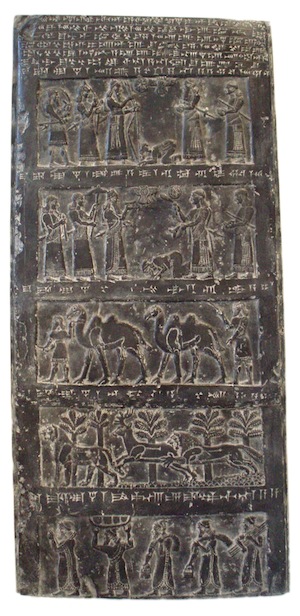
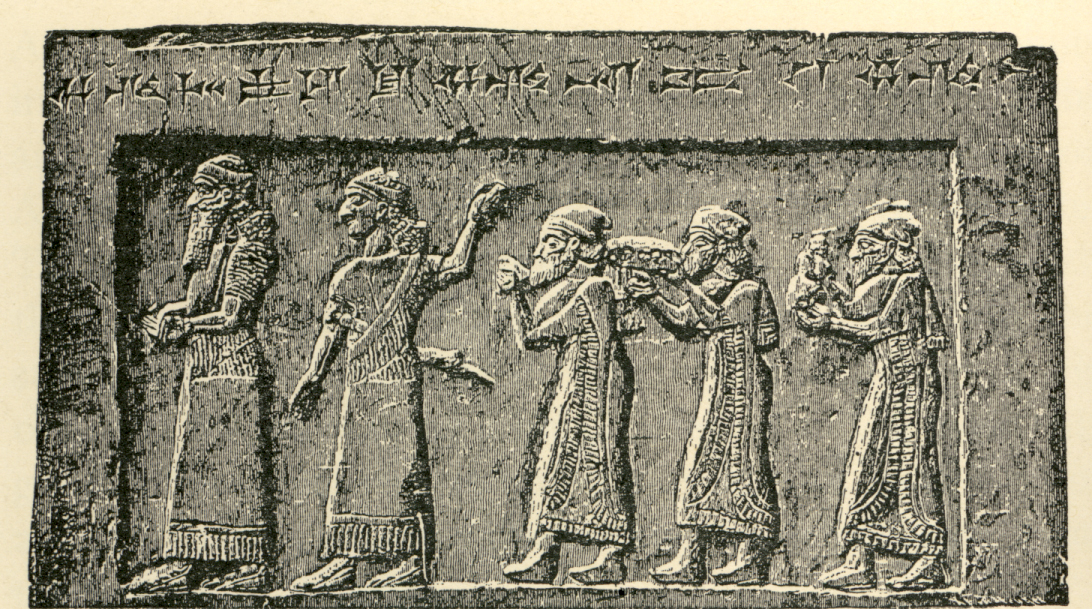
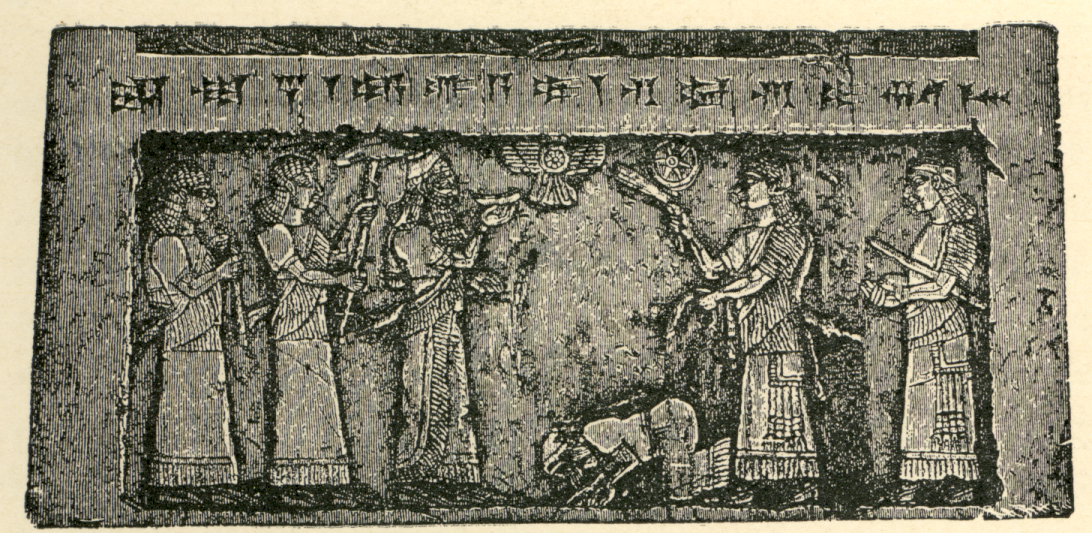
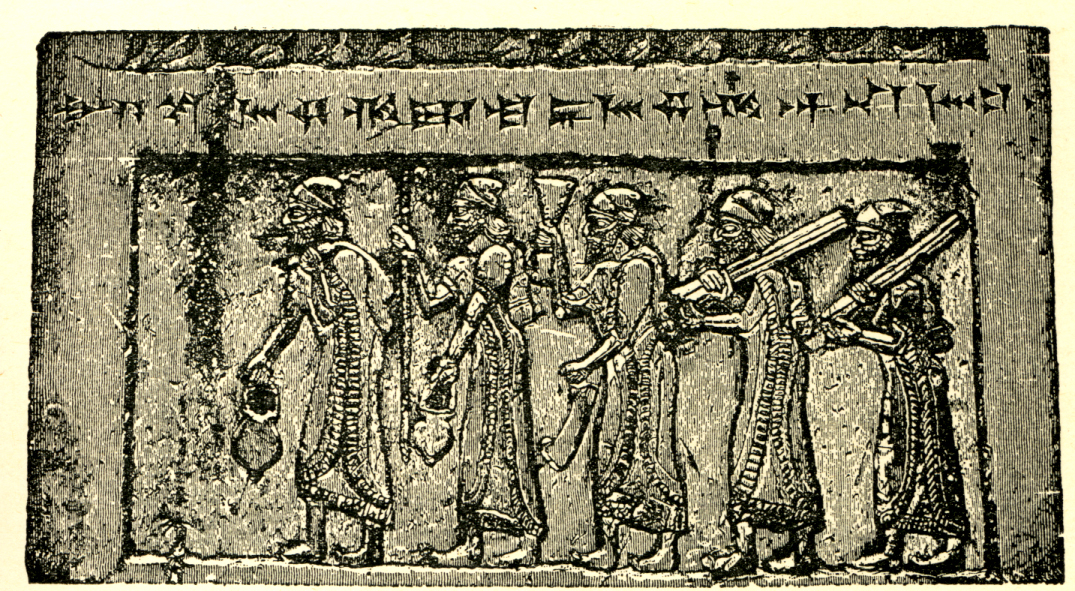
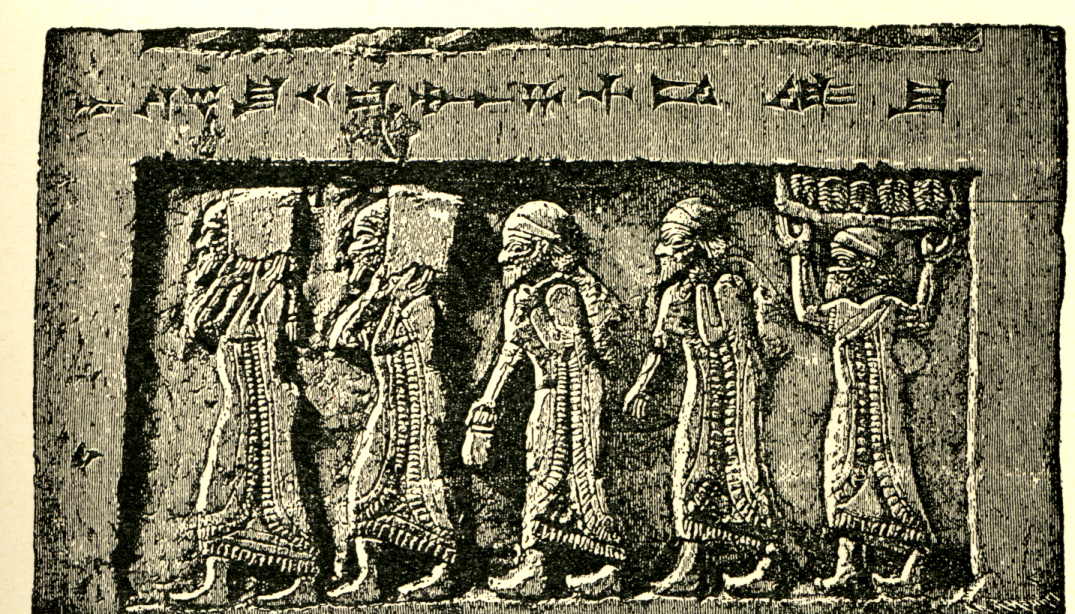
 Return to K. C. Hanson's Collection of Mesopotamian Documents
Return to K. C. Hanson's Collection of Mesopotamian Documents